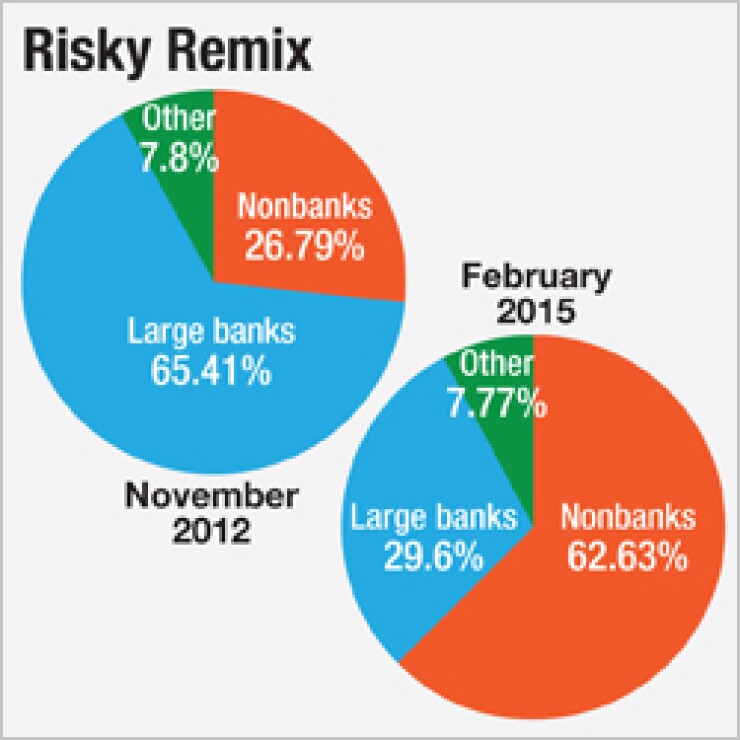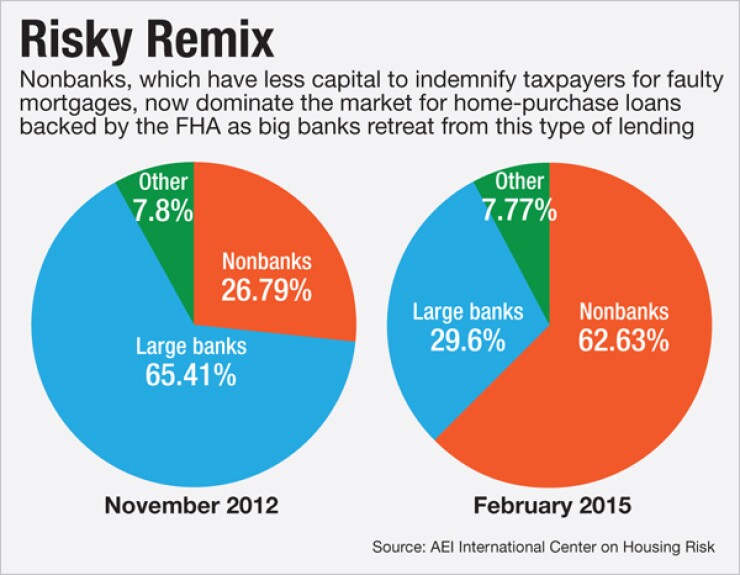

Large banks have practically given up on making loans to riskier borrowers backed by the Federal Housing Administration, while
Nonbanks
Large banks' share of FHA-backed home loans fell to 29.6% in February from 65.4% in November 2012, when the center first began tracking the data. By contrast, nonbanks' share jumped to 62.2% in February from 26.8% over the same period, virtually replacing the share ceded by large banks.
A growing concern is that if the economy sputters and employment drops, defaults would rise dramatically, putting low and moderate income borrowers at greater risk of losing their homes. Such a scenario would cause another round of financial stress to the FHA, experts say, since the agency would have a harder time making lenders eat the losses on poorly underwritten loans.
"The nonbanks are not deep pockets and many will not survive in a downturn," said Edward Pinto, co-director and chief risk officer at the Center on Housing Risk. "The FHA and taxpayers are going to be on the hook if the nonbanks do not make it through the next cycle because that's what history has shown."
The study may fuel more debate about the quality of FHA originators, even as the government pushes for increased lending to low and moderate-income borrowers.
The FHA could not be reached for comment.
The AEI study, released Friday, found massive turnover in the past three years among the ranks of FHA lenders. Ten of the top 25 FHA lenders in 2012 are no longer in the highest ranks, including five large banks: JPMorgan Chase, Fifth Third, PNC, M&T and Regions Financial. All have been replaced by nonbanks.
(The study defines large banks as those that have originated at least 20,000 home purchase loans in 2014. There are 10 large banks and 13 nonbanks doing that kind of volume.)
Nonbanks have much lower capital, are more lightly regulated and have been willing to lend to borrowers with lower credit scores, a major factor in higher defaults, the study found.
The FHA's mortgage insurance fund
Easy mortgage credit fueled unprecedented lending volumes and home price increases from 2001 to 2007, before the housing collapse. At the height of the boom, many lenders did not require verification of income. Now lenders have to verify a borrower's ability to repay a loan. At the same time,
Meanwhile, large banks have pulled back from originating and servicing FHA loans because of huge losses. (Since mid-2013, large banks have also been selling off servicing rights on various kinds of mortgages to comply with Basel III capital rules.)
The Justice Department and the Department of Housing and Urban Development, which oversees the FHA, have recovered more than $3 billion in settlements from the top banks including Bank of America, Citigroup and JPMorgan Chase. Wells Fargo has refused to settle allegations it engaged in "shoddy underwriting" of FHA loans
The retreat by large banks continues and has not hit bottom, Pinto said. Because of the dramatic pullback, large banks would have to dramatically lower their underwriting standards to regain FHA market share, which they are unlikely to do, he said.
"We're in trouble again because the nonbanks are more than willing to do the government's bidding of originating riskier loans and the large banks have not been willing to do it," Pinto said.
Pinto, a conservative critic of housing policy, has warned for years that low and moderate income borrowers are ill-served by the government's push to broaden homeownership. He is quick to point out that the FHA is exempt
In reality, many FHA loans have debt-to-income ratios of 55% or more. Moreover, the DTI ratios only take into account housing debt, not all other debts of the borrower; many borrowers also use gift funds for the down payment.
The study found that despite QM regulation, the share of loans with high debt-to-income ratios is increasing and nearly at 40% for all FHA loans. The FHA will insure loans to borrowers with FICO scores as low as 580 with a down payment of 3.5% or more. Borrowers with FICO scores as low as 500 can get an FHA loan but they must have at least a 10% down payment.
The FHA's median FICO score was 673 in February, below the U.S. median FICO score of 713, the study said.




